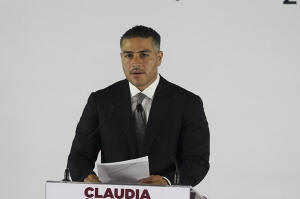Mexico's security chief quietly forms an elite force to take on the drug
cartels
[April 02, 2025]
By MARÍA VERZA
MEXICO CITY (AP) — Six years ago Mexico’s president disbanded the
country’s Federal Police and handed security responsibilities fully to
the military. Now, his successor has quietly begun to build an elite
civilian investigative and special operations force to fight the drug
cartels.
President Claudia Sheinbaum had already shown a willingness early in her
presidency to move away from former President Andrés Manuel López
Obrador’s oft-criticized “hugs, not bullets” strategy. It focused on
addressing the social roots of crime rather than directly confronting
Mexico’s powerful cartels.
Sheinbaum's security chief, Omar García Harfuch, is drawing on his law
enforcement contacts — mostly from the former ranks of the Federal
Police — to claw back security capabilities from the armed forces with a
civilian force under his direct command.
The government has yet to formally announce the new National Operations
Unit, known by its Spanish initials UNO, but its existence is an open
secret among former members of the Federal Police, where García Harfuch
started his career.
Three Mexican officials, all of whom requested anonymity to speak about
the still unannounced force, confirmed its existence to The Associated
Press.
Security analyst David Saucedo, who has spoken with people who have
joined the force, said he believes García Harfuch's main objective is to
have an armed force that allows him to meet demands from Washington.

UNO takes shape
The unit began to form shortly after Sheinbaum took office and it hopes
to have 800 members by the end of the year, said one federal official,
who is familiar with many of the unit’s details.
On Monday, while García Harfuch was in Washington meeting with the Trump
administration, the security ministry published a call for college
graduates to make up “the first generation of investigative and
intelligence agents,” saying only they would be part of a specialized
group to strengthen the country’s security.
UNO will have three branches distributed geographically across Mexico,
as well as a high-impact team that will be the “elite of the elite,” the
federal official said.
Its current members are mostly former Federal Police and members of the
special operations team García Harfuch created when he was Mexico City’s
police chief. Most have previously received training from security
forces from the United States, Colombia, Spain or France.
His challenge is rebuilding the trust of his U.S. counterparts after
López Obrador limited U.S. agents’ movements in Mexico and do it as
President Donald Trump pressures Mexico to step up the fight against
fentanyl trafficking.
A controversial past
Shortly after taking office, López Obrador replaced the Federal Police
with a new force, the National Guard, that he sold to the public as
civilian, but that was always led by and made up of the armed forces.
He lambasted the Federal Police as too corrupt to save and made Mexico’s
former security chief Genaro García Luna, then facing trial in the U.S.
and eventually convicted of working for the Sinaloa cartel, the poster
child. He cut funding for training and equipping local police.

[to top of second column]
|

Minister of Security and Citizen Protection Omar Garcia Harfuch
speaks during a presentation of incoming President Claudia
Sheinbaum's Cabinet members in Mexico City, July 4, 2024. (AP
Photo/Marco Ugarte, File)

What followed were six years of what critics decried as militarization
that effectively concentrated unprecedented authority in the hands of
the armed forces.
Despite that, levels of violence remained stubbornly high and critics
said the cartels grew stronger, fueled by soaring revenue from fentanyl.
One of the main criticisms of the National Guard and military was that
while they had numbers and fire power they did not have the
investigative skills needed to dismantle large criminal organizations.
García Harfuch was initially a “toothless tiger,” who was frequently
denied resources, information and investigative files by other security
entities, said Saucedo, based in Guanajuato state, Mexico’s most
violent.
UNO puts an elite force under his direct command.
The Mexican federal official denied that UNO’s objective was to satisfy
Trump, but noted the unit was involved in the unprecedented delivery of
29 high-profile cartel figures to the United States at the height of
negotiations between the two countries to suspend threatened tariffs.
They were pulled out of prisons all over Mexico, assembled and sent to
the U.S. without incident.
The challenge: avoid corruption
Special operations forces, be it from the Navy, Army, Federal Police or
state police, have a checkered history in Mexico, having been involved
in many scandals and abuses of power, extrajudicial killings and
infiltration by cartels.
“There have been a lot of cases that were bad,” said the previously
quoted federal official, who added that there were also honest police.
He said the security ministry is emphasizing stricter screening,
exhaustive background investigations and better pay once they’re in.

García Harfuch’s influence also extends to states where Sheinbaum's
party holds power. People he trusts are taking key security positions
and UNO will train state special operations teams that are also made up
of many former Federal Police.
The southern state of Chiapas, where Mexico’s most powerful cartels are
battling for control of smuggling routes, announced a special operations
force in December called the Pakal with some 500 members. Two members
told the AP they were ex-Federal Police and did eight months of
specialized training to join the Pakal.
But doubts remain. For Saucedo, since the new elite force doesn’t yet
have effective internal controls and accountability mechanisms, “there’s
no guarantee that this elite group won’t commit the excesses committed
by other special operations groups.”
___
Associated Press writer Edgar H. Clemente in Tapachula, Mexico
contributed to this report.
All contents © copyright 2025 Associated Press. All rights reserved |